Hello, mates. How are you all? I hope you're all very well. Finally, winter has started to make itself felt enough. We almost started to think that the whole winter season would be sunny like spring. These days, due to the very cold and rainy weather, I don't have the opportunity to travel much. I usually spend my time at home. For this reason, I cannot produce material for new travel content.
But I realised that there are some of my photos and impressions from my previous trips that I have not shared with you. I think the most important of these is the Amasya Museum, which I am preparing now.
Merhaba arkadaşlar. Nasılsınız? Umarım hepiniz çok iyisinizdir. Nihayet kış kendini yeterince hissettirmeye başladı. Neredeyse artık bütün kış mevsiminin sanki ilkbahar gibi güneşli geçeceğini düşünmeye başlamıştık. Bu günlerde havaların çok soğuk ve yağışlı gitmesi sebebiyle pek fazla gezme fırsatı bulamıyorum. Genelde zamanımı evde geçiriyorum. Bu sebeple yeni gezi içerikleri için materyal üretemiyorum.
Fakat daha önceki gezilerime ait fotoğraf ve izlenimlerimden sizlerle paylaşmadıklarımın olduğunu fark ettim. Bence bunlardan en önemlisi de şuan hazırladığım Amasya Müzesi.

In the cities I visit, I always visit the city museums first. Because in city museums I get the most concrete and permanent information about that city and its history. Amasya Museum was one of the first places I visited in Amasya.
In the museum, fossils from millions of years ago, artefacts from the Seljuk, Mongol, Roman and Ottoman periods are exhibited. While visiting the first floor of the museum, I thought that this place was the same as the other museums. Historical and cultural artefacts were exhibited here as in other museums. But I was thinking "fine", after all, I might not have the opportunity to come to Amasya again. It would not be a pleasant situation for me not to see the museum while I was here.
But when I went to the second floor of the museum, I realised that the whole atmosphere had changed in an instant. Firstly, I saw that the windows from old buildings were exhibited here. I had the feeling that I would encounter very different things. When I went a little further, there was a very large floor mosaic brought from one of the neighbouring villages. I had seen it before, it was nothing I had not seen before. But I thought that I had such a strange feeling because I was going to see Teşup, the Storm God, whose picture I had seen at the entrance of the museum. When I went a little further, Teşup was also in front of me, but the strange feeling inside me still had not passed.
Eventually, although we were on the upper floor, there was a step-high section in the corner, and things like a glass lantern could be seen from a distance. When I approached, I saw that there were mummies in these lanterns. It was the first time I had ever seen mummies. For a moment I felt like I was inside one of the huge pyramids in Egypt, even though I had never been there. The mummies were in pristine condition. Eight mummies. Yes, there are eight mummies on display here. Four of these mummies are adults and the other four are children.
The mummies, which I learnt from the informative article that they belong to the 14th century, are almost 800 years old. For 800 years they have been lying there looking up without blinking their eyes.
Ziyaret ettiğim şehirlerde ilk önce mutlaka şehir müzelerine uğrarım. Çünkü şehir müzelerinde o şehir ve tarihi hakkında en somut ve kalıcı bilgiler edinirim. Amasya şehrinde de Amasya Müzesi ilk ziyaret ettiğim yerlerdendi.
Müzede milyonlarca yıl öncesinden fosiller, Selçuklular, Moğollar, Roma ve Osmanlılar dönemine ait eserler sergileniyor. Müzenin ilk katını gezerken burasının da diğer müzelerle aynı olduğu düşüncesine kapılmıştım. Burada da diğer müzelerde olduğu gibi tarihi ve kültürel eserler sergileniyordu. Ama "olsun" diyordum içimden, sonuçta Amasya'ya bir daha gelme fırsatım olmayabilirdi. Gelmişken müzesini de görmemek benim için hoş bir durum olmazdı.
Fakat Müzenin ikinci katına çıkınca bütün havanın bir anda değiştiğini fark ettim. Burada önce eski yapılardan kalan pencerelerin sergilendiğini gördüm. İçimde çok farklı şeylerle karşılaşacağım hissi vardı. Biraz daha ilerlediğimde civar köylerin birinden getirilmiş oldukça büyük bir zemin mozayiği vardı. Daha önce görmüştüm, görmediğim bir şey değildi. Fakat müzenin girişinde resmini gördüğüm Fırtına Tanrısı Teşup'u görecek olmamdan dolayı böyle garip bir hisse kapıldığımı düşündüm. Biraz daha ilerlediğimde Teşup da karşımdaydı ama içimdeki garip his hala geçmiş değildi.
En sonunda üst katta olmamıza rağmen köşede bir basamak yüksekliğinde bir bölüm vardı ve uzaktan cam fanus gibi şeyler görülebiliyordu. Yanına yaklaştığımda gördüm ki bu fanusların içinde mumyalar vardı. İlk defa mumya görüyordum. Bir an hiç gitmediğim halde kendimi Mısır'daki devasa piramitlerden birinin içindeymiş gibi hissettim. Mumyalar pek bozulmamış halde duruyorlardı. Tam sekiz tane. Evet burada tam sekiz tane mumya sergileniyor. Bu mumyalardan dört tanesi yetişkin, diğer dört tanesi de çocuk mumyası.
Bilgilendirici yazıdan 14. yüzyıla ait olduğunu öğrendiğim mumyalar neredeyse 800 yaşındalar. 800 yıldır hiç gözlerini kırpmadan öylece yatıp yukarılarda bir yerlere bakıyorlar.
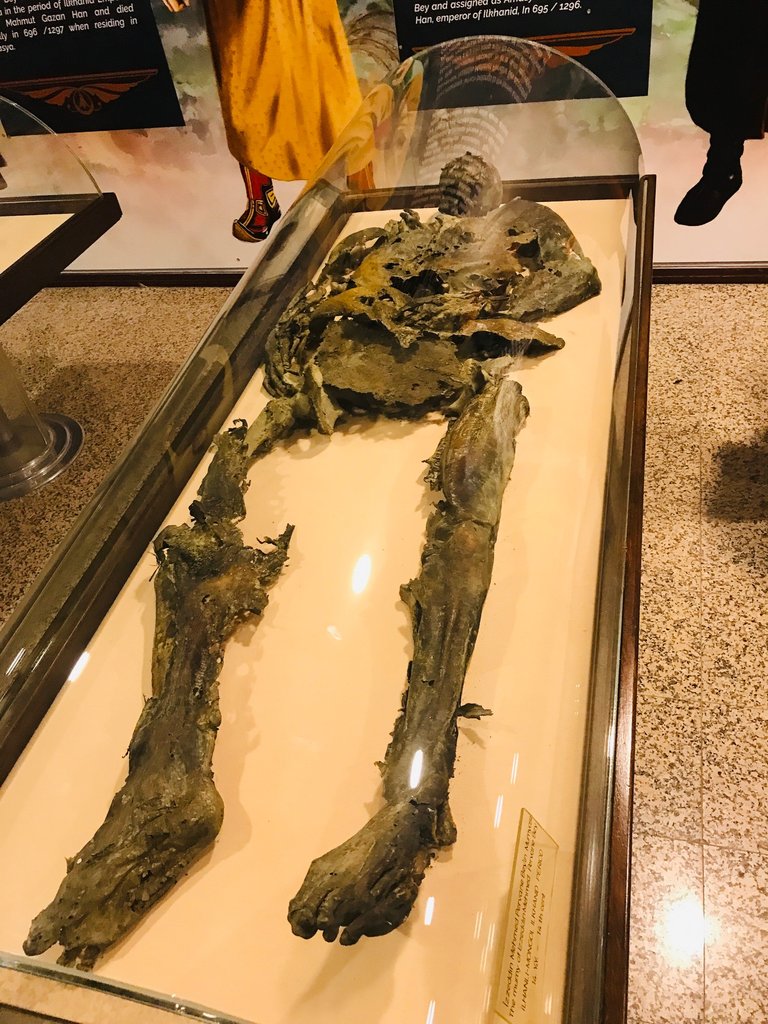
Although the mummies are deteriorating, the most magnificent one belongs to İzzeddin Pervane Bey. According to the informative inscription next to the mummy, İzzeddin Pervane Bey was the governor of Amasya, which was then under the rule of the Ilkhanids (Mongols). İzzeddin Pervane was mummified together with his wife and two children.
Mumyalardan bozulmaya yüz tutsa da en ihtişamlısı İzzeddin Pervane Bey'e ait. Mumyanın yanındaki bilgilendirme yazısına göre İzzeddin Pervane Bey, o dönemler İlhanlılar (Moğollar) idaresinde bulunan Amasya'nın valisidir. İzzeddin Pervane, eşi ve iki çocuğuyla beraber mumyalanmıştır.


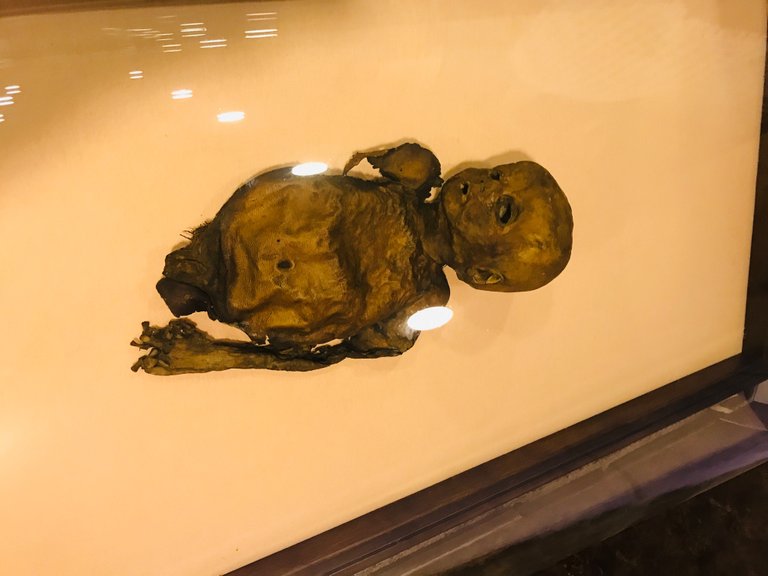
The mummies are of course the most important remains in the museum, but there is another artefact here that is at least as important as them, and that is the bronze statue of the Storm God Teşup from the 15th century BC. When I say statue, it is not a big thing. It could be called a figurine. I quote the information text exactly as it is.
"It is one of the rare artefacts among the known bronze Hittite statues. The chief god of the Hittite community of gods is the Sky/Air God and is also called the Storm God. It is thought that the lower half of the body was destroyed by the civilisations after the Hittite period in order to eliminate the belief in this god."
⬇️⬇️⬇️
Müzede mumyalar tabi ki bence en önemli kalıntılar fakat burada en az onlar kadar öneme sahip bir başka eser var o da M.Ö 15. yy'a ait Fırtına Tanrısı Teşup'un Bronz heykeli. Heykel dediysem de öyle büyük bir şey de değil. Heykelcik denebilir. Bilgilendirme yazısını aynen olduğu gibi aktarıyorum.
"Bilinen bronz Hitit heykelleri arasında başka örneği bulunmayan nadir eserlerden biridir. Hititlerin tanrılar topluluğunun baş tanrısı Gök/Hava Tanrısı olup Fırtına Tanrısı olarak da isimlendirilir. Hitit dönemi sonrasındaki uygarlıklar tarafından bu tanrıya ait inancı ortadan kaldırmak için gövdesinin alt yarısının tahrip edildiği düşünülmektedir."
⬇️⬇️⬇️

I end my content with photographs of other artefacts in the museum.
Müzede bulunan diğer eserlere ait fotoğraflarla içeriğimi sonlandırıyorum.





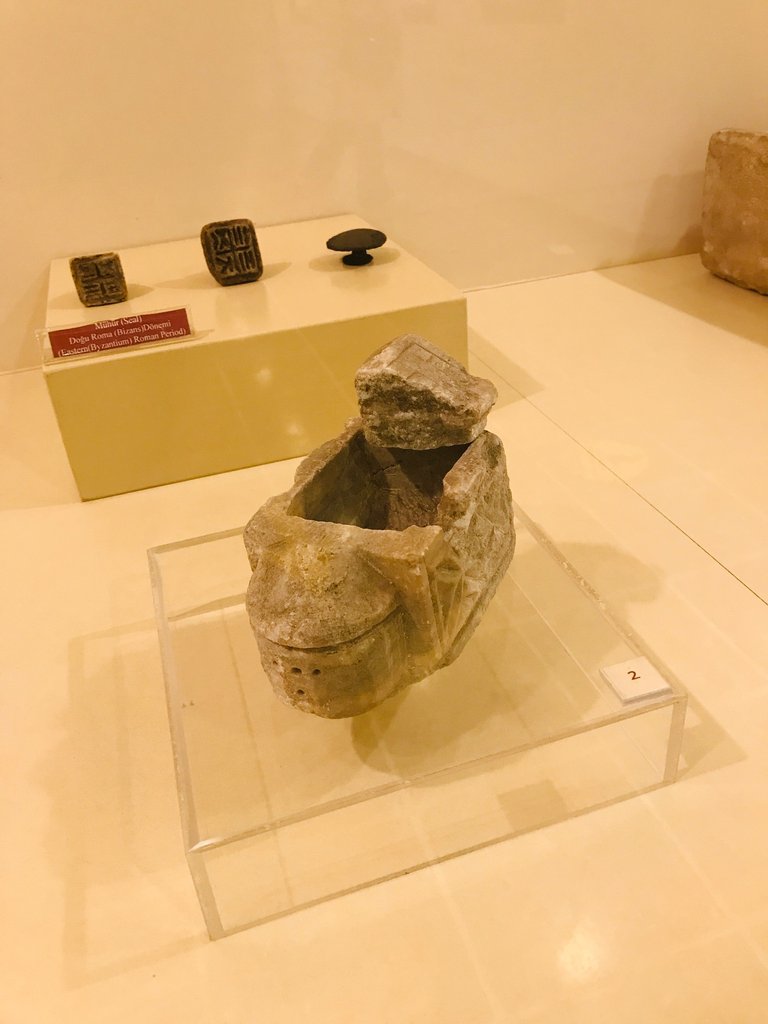
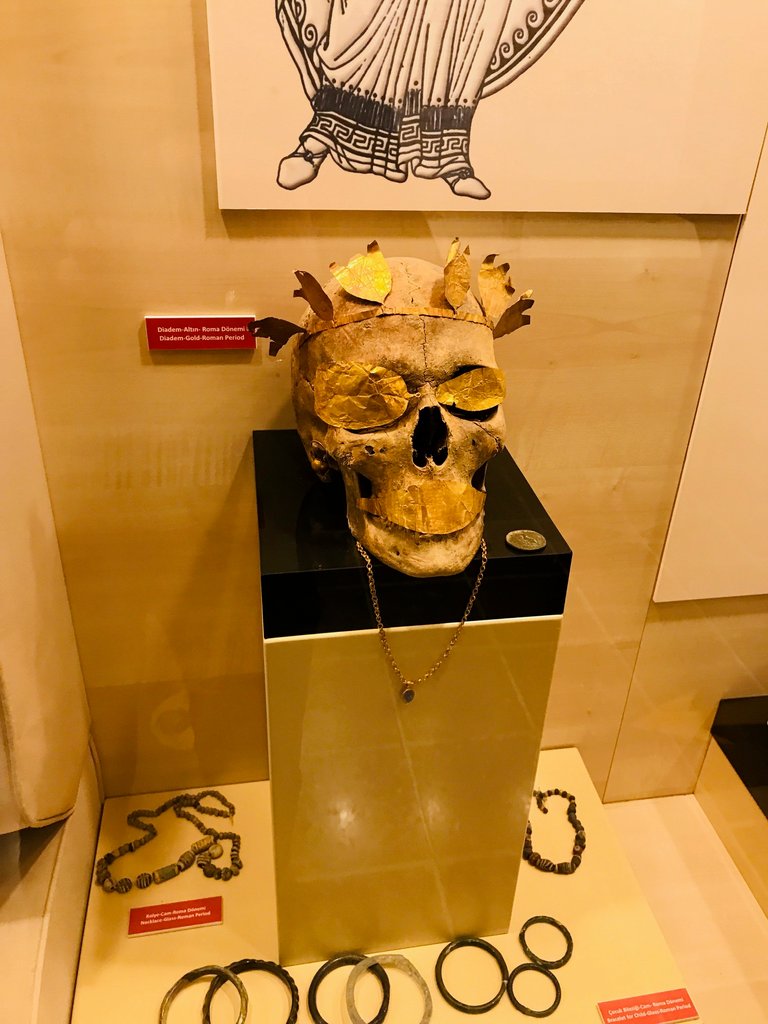
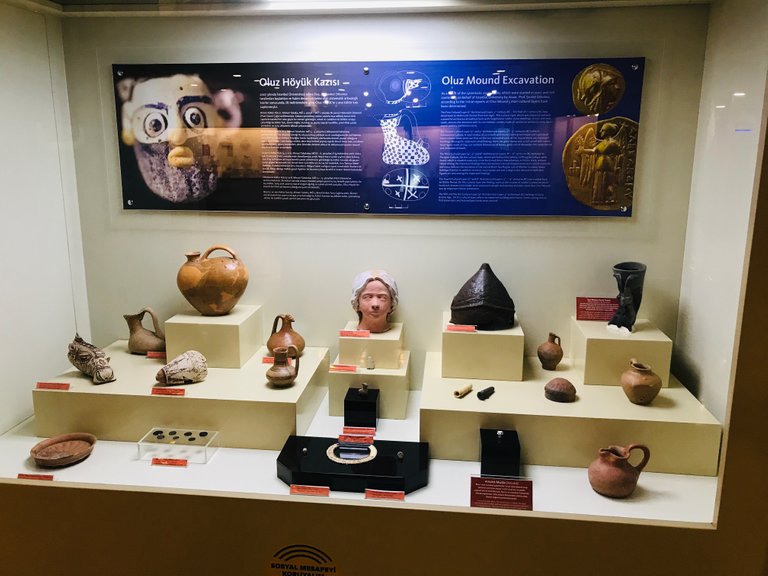

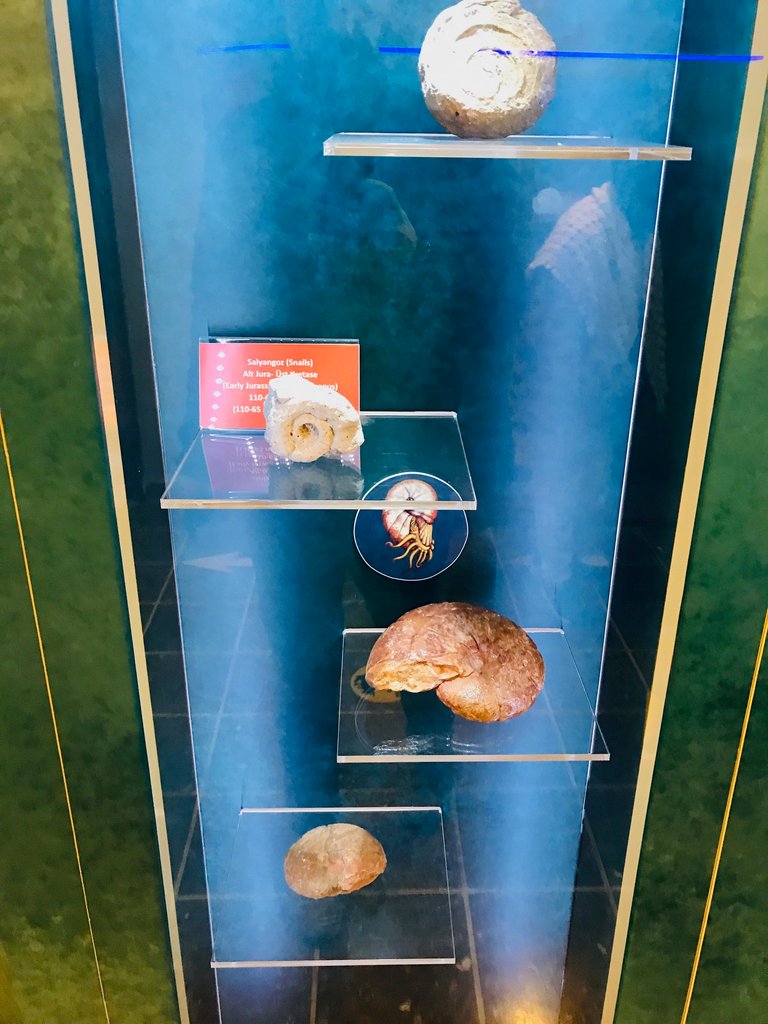




Visiting the Amasya Museum was a very different and pleasant experience for me. I was very satisfied with this trip. I think those who are travelling to Amasya should definitely visit this museum.
See you in my next post. Take care of yourself 🙋♂️
Amasya müzesini ziyaret etmek benim için çok farklı ve keyifli bir deneyimdi. Bu gezimden fazlasıyla memnun kalmıştım. Amasya'ya yolu düşenlerin kesinlikle bu müzeyi ziyaret etmeleri gerektiğini düşünüyorum.
Bir sonraki paylaşımımda görüşmek üzere. Kendinize iyi bakın 🙋♂️





